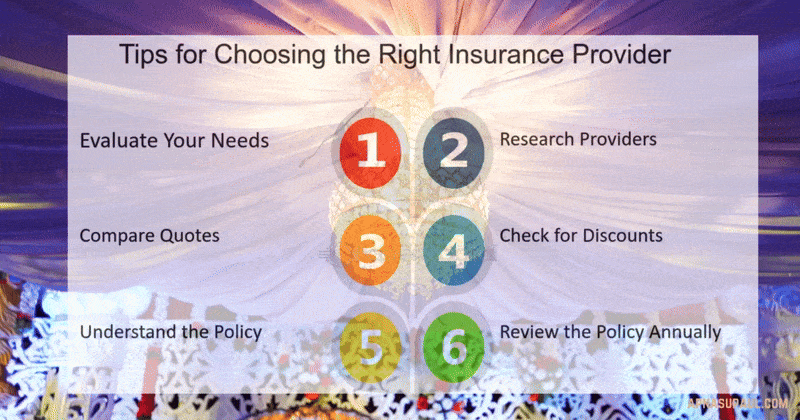Organizing an event, whether it’s a wedding, corporate gathering, concert, or trade show, involves meticulous planning. One crucial aspect often overlooked is event insurance. This essential safeguard protects against unforeseen circumstances that could disrupt your event or lead to financial losses. In this comprehensive guide, we’ll explore everything you need to know about choosing the right event insurance policy to ensure your special occasion is stress-free.
What Is Event Insurance?
Event insurance is a specialized form of coverage that protects event organizers from potential financial losses arising from unexpected occurrences. These may include cancellation, property damage, injuries, or weather-related disruptions. Depending on the policy, it can cover:
- Event cancellation or postponement: Refunds due to unforeseen circumstances.
- Liability coverage: Protection against third-party claims for injuries or damages.
- Property damage: Coverage for rented equipment or venue damages.
- Weather insurance: Compensation for weather-related cancellations (important for outdoor events).
- Special coverages: Protection for unique risks, such as terrorism or reputational damage.
Why Do You Need Event Insurance?
The unexpected can happen despite the best planning. Here are some key reasons to invest in event insurance:
- Financial Protection: It saves you from substantial financial losses due to cancellations, damages, or legal claims.
- Venue Requirements: Many venues mandate event liability insurance as a condition for booking.
- Peace of Mind: Knowing you’re covered allows you to focus on hosting a successful event without worrying about unforeseen mishaps.
- Guest Safety: In case of accidents or injuries, liability insurance ensures that medical expenses are covered.
Key Types of Event Insurance
Before selecting a policy, understand the different types of event insurance:
1. Event Cancellation Insurance
This covers non-refundable expenses if the event is canceled or postponed due to unforeseen circumstances, such as extreme weather, illness, or vendor no-shows.
2. General Liability Insurance
Covers claims arising from bodily injuries, property damage, or accidents during the event. This is often required by venues.
3. Property Insurance
Provides coverage for damages to rented equipment, decorations, or the venue.
4. Host Liquor Liability Insurance
Essential for events serving alcohol, this policy protects against claims related to alcohol-related incidents.
5. Weather Insurance
Covers financial losses due to adverse weather conditions, particularly important for outdoor events.
6. Vendor Insurance
Covers issues with vendors, such as non-performance or damages caused by their equipment.
Factors to Consider When Choosing Event Insurance
Selecting the right event insurance requires careful consideration of several factors:
1. Nature of the Event

The type and scale of the event significantly impact the coverage you need. A large outdoor music festival, for example, requires different coverage than a small indoor wedding.
2. Budget
Evaluate your budget and determine how much you can allocate for insurance. Remember, it’s an investment that could save you substantial losses.
3. Venue Requirements
Check with your venue for specific insurance requirements. Many venues require proof of liability coverage.
4. Policy Exclusions
Carefully review what the policy does not cover. Common exclusions include:
- Acts of terrorism
- Pre-existing weather conditions
- Intentional damages
- Negligence
5. Vendor Contracts
Ensure your vendors have their own insurance and understand their policies. Their coverage may complement your own.
6. Coverage Limits
Assess the maximum coverage limits and ensure they’re sufficient to cover potential losses.
Steps to Purchase the Right Event Insurance
Follow these steps to secure the best event insurance for your needs:
1. Assess Your Risks
Identify potential risks for your event. Consider factors like weather, crowd size, and the nature of activities planned.
2. Compare Policies
Shop around and compare policies from multiple insurers. Look for comprehensive coverage and competitive pricing.
3. Read Reviews
Research the reputation of insurers. Reviews from other event organizers can provide insights into the reliability of a provider.
4. Consult an Expert
If unsure, consult an insurance broker or agent specializing in event insurance. They can help tailor a policy to your needs.
5. Review the Fine Print
Before signing, read the policy details thoroughly. Pay attention to exclusions, claim processes, and coverage limits.
Top Tips for Choosing Event Insurance

- Start Early: Purchase insurance as soon as you begin planning to ensure comprehensive coverage.
- Customize Your Policy: Tailor the coverage to your specific event needs rather than opting for a generic policy.
- Verify Coverage Period: Ensure the policy covers the entire event timeline, including setup and teardown days.
- Document Everything: Keep detailed records of contracts, invoices, and communications with vendors and insurers.
- Plan for the Worst: Think about worst-case scenarios and ensure you’re adequately covered.
What to Do in Case of a Claim
If you need to file a claim, follow these steps:
- Notify the Insurer Promptly: Inform your insurer as soon as possible about the incident.
- Provide Documentation: Submit relevant documents, including receipts, contracts, and photos of damages.
- Follow Up: Stay in touch with your insurer to ensure the claim process is progressing smoothly.
Also Read : The Impact of Digitalization on the Insurance Industry

